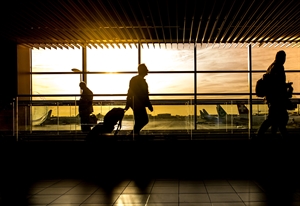The rare infectious disease monkeypox, which is usually confined to Central and West Africa, has been occurring in countries around the world, including US, Canada, France, Germany and Australia.
What is monkeypox?
Monkeypox is a rare disease, but there are outbreaks of it from time to time. It is spread mainly through close contact with an infected person.
Most people who catch monkeypox recover without treatment after a few weeks of mild symptoms. But some people do get very ill from monkeypox.
Monkeypox is contagious, that is, it spreads from person to person, although you need to have very close contact to catch it. The virus can enter the body through broken skin, through being breathed in or through mucous membranes.
People have also caught monkeypox from infected animals, most often rodents.
What are the symptoms of monkeypox?
Monkeypox symptoms begin between five and 21 days after exposure and include:
- exhaustion
- fever and chills
- headache
- muscle and back aches
- swollen glands
A monkeypox rash develops a few days later. It is sometimes confused with chickenpox. At first it looks like raised spots. These become blisters, which form scabs that dry up and fall off. The infected person is contagious until all the scabs have fallen off and their skin is healed.
If you experience monkeypox symptoms and you think you may have been exposed to monkeypox, limit your contact with others and ask your family doctor for advice, or get medical advice while you are traveling. Let them know about your recent travel history, or if you have had contact with someone recently returned from Africa so that you can be referred for appropriate tests, investigations and treatment.
Can I get vaccinated against monkeypox?
There is a vaccine for monkeypox, but it is not generally available for prevention purposes. If you are exposed to monkeypox then your doctor may offer you post-exposure vaccination against monkeypox.
To learn more about Canada’s response to monkeypox, see this statement from the minister of health. The Government of Canada also has a monkeypox outbreak update page.
How do I avoid monkeypox?
The best way to avoid catching monkeypox is to avoid close contact with an infected person. Also avoid sharing bedding, clothing and personal items like towels with a person who has monkeypox. The shed scabs from monkeypox spots might be infectious, too.
People have also caught monkeypox from animals in west and central Africa. During a monkeypox outbreak avoid eating bushmeat (that is, meat from wild animals hunted in the region).
Am I at risk from monkeypox on my vacation?
Most travellers are not at risk from monkeypox. It is unlikely that you will be exposed to it while travelling in most parts of the world.
Check the Government of Canada’s travel advisories as you plan your trip abroad. This will help you assess the risk of exposure to monkeypox and other diseases such as malaria and hepatitis A.
You can also make an appointment at a travel health centre, like Canadian Travel Clinics six to eight weeks before you travel. A travel health professional can advise on steps you can take to reduce your chances of becoming ill while travelling, including mosquito avoidance and vaccinations.

